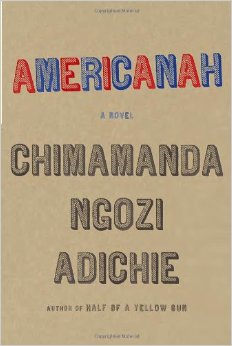Book review: Americanah, by Chimamanda Ngozi Adichie
Many people had mentioned Americanah, by Chimamanda Ngozi Adichie, to me before I read it. I had planning on reading it for what felt like a long time. And when I finally did get around to it, I wondered what had taken me so long to start. Once I picked up Americanah, I found that I could not put it down. It offered that rare combination of excellent writing, absorbing storytelling, and challenging content. Now, normally, I don’t read novels to be challenged, necessarily. I don’t go to any trouble to seek out books — particularly novels — that I think will make me feel uncomfortable. But Americanah often did make me feel uncomfortable, and it did challenge me. And I loved it.
The novel follows its protagonist, smart and pretty Ifemelu, from Lagos to the East Coast of the United States and then back again, tracing her struggles and triumphs as she adjusts first to life in the United States and then to life in a changed Nigeria. Americanah (the title is taken from a Nigerian slang term for a Nigerian who has gone abroad and become Americanized) is about love, race, culture shock, aspiration, and nostalgia. The love story happens between Ifem and her high school and early university boyfriend, contemplative, handsome Obinze. Ifem and Obinze’s stories intersect, separate, and then intersect again, across decades and continents, until Ifem makes the fateful decision to leave her comfortable American life (and black American boyfriend) and return to Nigeria.
The race, culture shock, aspiration, and nostalgia aspects of the story are drawn in vivid detail as Ifem negotiates her life in the United States, first as a struggling international undergraduate student at a Philadelphia college, later as a successful race blogger, and finally as a disaffected fellow at Princeton. As Ifemelu is beginning to navigate her radically different life in the U.S., Obinze also departs Nigeria for the UK, where he works illegally and tries to land a green card marriage with an EU citizen before being deported. He then builds a highly successful life for himself back in Lagos, including marriage and a child.
Ifem and Obinze’s experiences abroad and back home, and the challenges they encounter as Nigerians in America and the UK, are parallel stories of people grappling with identity — racial, national, and individual — while seeking fulfillment and connections with people who don’t necessarily understand or empathize with those challenges. For Ifem, these struggles play out as she enters into relationships with Americans — both black and non-black — and tries to reconcile her identity as a Nigerian with her new identity as a black person in America. Some of the book’s most trenchant observations — and it is packed full of them — come as Ifemelu, a person who never considered herself black before leaving Nigeria, encounters America’s specific, prickly brand of racial politics. One of my favorite little scenes is when Ifemelu first arrives in Philadelphia and goes shopping with her high school friend Ginika, who has lived in the US much longer than she has. Two girls are working in the store: one black, and one white. The white girl helps Ginika.
At the checkout, the blond cashier asked, ‘Did anybody help you?’
‘Yes,’ Ginika said.
‘Chelcy or Jennifer?’
‘I’m sorry, I don’t remember her name.’ Ginika looked around, to point at her helper, but both young woman had disappeared into the fitting rooms at the back.
‘Was it the one with the long hair?’ the cashier asked.
‘Well, both of them had long hair.’
‘The one with dark hair?’
Both of them had dark hair.
Ginika smiled and looked at the cashier and the cashier smiled and looked at her computer screen, and two damp seconds crawled past before she cheerfully said, ‘It’s okay, I’ll figure it out later and make sure she gets her commission.’
As they walked out of the store, Ifemelu said, ‘I was waiting for her to ask, “Was it the one with two eyes or the one with two legs?” Why didn’t she just ask “Was it the black girl or the white girl?”‘
Ginika laughed. ‘Because this is America. You’re supposed to pretend that you don’t notice certain things.’
There are also plenty of sharp observations about the lives of Nigerians abroad, and the way they interact with each other. At one point, Ifemelu, by now a fellow at Princeton, is waiting in line for a taxi and anticipates the driver’s nationality with some trepidation.
Ifemelu joined the taxi line outside the station. She hoped her driver would not be a Nigerian, because he, once he heard her accent, would either be aggressively eager to tell her that he had a master’s degree, the taxi was a second job, and his daughter was on the dean’s list at Rutgers; or he would drive in sullen silence, giving her change and ignoring her ‘thank you,’ all the time nursing humiliation, that this fellow Nigerian, a small girl at that, who perhaps was a nurse of an accountant or even a doctor, was looking down on him. Nigerian taxi drivers in America were all convinced that they really were not taxi drivers.
As Ifemelu becomes more familiar with the concept of race in America, she starts a blog in which she anonymously doles out observations from the perspective of a non-American black. One of those posts is titled ‘Friendly Tips for the American Non-Black: How to React to an American Black Talking About Blackness.’ As an American non-black myself, I found this post fascinating and challenging. For example, in the post, Ifemelu counsels the American non-black reader thusly:
Don’t bring up your Irish great-grandparents’ suffering. Of course they got a lot of shit from established America. So did the Italians. So did the Eastern Europeans. But there was a hierarchy. A hundred years ago, the white ethnics hated being hated, but it was sort of tolerable because at least black people were below them on the ladder. Don’t say your grandfather was a serf in Russia when slavery happened because what matters is you are American now and being American means you take the whole shebang, America’s assets and America’s debts, and Jim Crow is a big-ass debt. Don’t say it’s just like antisemitism. It’s not. In the hatred of Jews there is also the possibility of envy — they are so clever, these Jews, they control everything, these Jews — and one must concede that a certain respect, however grudging, accompanies envy. In the hatred of American Blacks, there is no possibility of envy — they are so lazy, these blacks, they are so unintelligent, these blacks.
When Ifemelu heads back to Lagos, however, she shudders her race blog and instead begins to blog about social issues in Nigeria. As she carves out a life for herself in a city that she once understood well, but in which she now feels a bit alien, she reconnects with Obinze, and their love story — complicated and fractured as it is — resumes. The resumption of their story feels both satisfying and frustrating, and the resolution (no spoilers!) is both satisfying and unsatisfying. Just like life.
I really loved this book. I want to read more of Adichie’s writing right away, and I highly recommend you do the same. In case you’re interested, here is an interview with Adichie on NPR.


I loved this book as well. Did you notice the multiple references to “The Heart of the Matter” by Graham Greene? There are a number of interesting parallels, and even reading it after “Americanah” enriched my appreciation of the latter. Highly recommended.